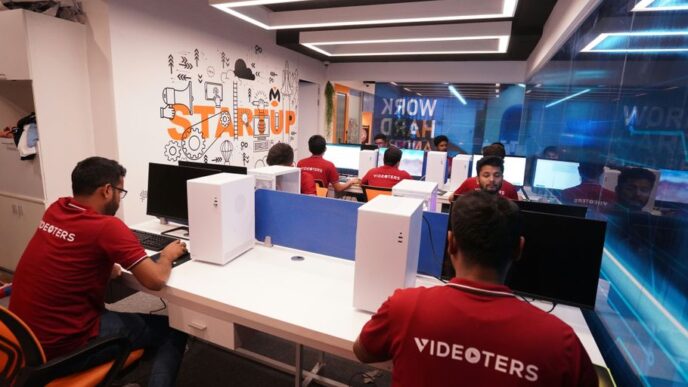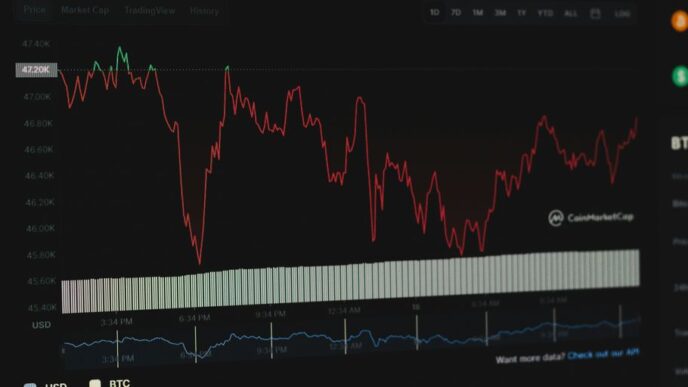Looking for a job that lets you work from anywhere? You’re in luck! Many companies are hiring remote workers right now. This guide will help you find those opportunities and get hired. We’ll cover how to find companies that match what you’re looking for, what jobs are open, and how to actually get one. Let’s get started finding your next remote role.
Key Takeaways
- Find remote companies that fit your personal values and what you care about.
- Understand what these remote companies do and what their work environment is like.
- See the current job openings at these remote companies.
- Learn how to apply and prepare for interviews with remote employers.
- Get tips on how to successfully land and negotiate your remote job offer.
Explore Top Remote Companies Hiring Now

Looking for a job that lets you work from your couch? You’re in luck! Lots of companies are hiring remote workers right now, and finding the right fit can make a big difference in your day-to-day life. It’s not just about the paycheck; it’s about finding a place that feels right, you know? The trick is knowing where to look and what to look for.
Find Companies Aligned With Your Values
It’s pretty cool that you can now find companies that match what you believe in, even if you’re not in the same city. Think about what’s important to you. Is it environmental sustainability? Supporting local communities? Or maybe a company that really pushes for diversity and inclusion? You can actually check out company profiles to see what they’re all about. It’s like a compatibility test for your career. For instance, some companies are really focused on giving back, and you can find those by looking at their community involvement sections on their websites. It’s a good way to start your search for a place like BAE Systems that might align with your personal goals.
Learn About Company Missions and Culture
Every company has a mission statement, right? But what does that actually mean for the people working there? Digging into a company’s mission and culture is key. Are they all about innovation, or is it more about steady, reliable work? What’s the vibe like? Do they encourage collaboration, or is it more independent work? Some places have really open communication, where you can see what the leaders are thinking. Others might be more traditional. Reading employee reviews can give you a peek into this, but also check out their ‘About Us’ pages. They often share stories about how they started and what drives them.
Discover The Work These Remote Companies Do
So, what exactly are these remote companies doing? It’s a huge range. You’ve got tech companies building the next big app, healthcare providers offering virtual consultations, and even manufacturing firms that need remote support staff. It’s not all just coding and customer service, though those are big. Think about marketing, HR, project management, and even some specialized engineering roles. Understanding the actual product or service helps you see where you might fit in and how your work contributes to the bigger picture. It’s pretty neat to see how many different industries have embraced remote work.
Immediate Opportunities With Remote Companies
Feeling that itch to switch gears and find a job you can do from anywhere? You’re in luck! Lots of companies are actively looking for people right now, and the best part is, you don’t even need to leave your couch. It’s a great time to jump into the remote job market.
Access Current Job Openings
So, where do you actually find these jobs? Websites like Indeed are packed with listings. You can often see which companies are hiring immediately, meaning they’re ready to bring someone on board pretty quickly. It’s not just about finding any job; it’s about finding one that fits your life. You can check out remote jobs that are hiring to get started.
Filter By Industry And Role
Don’t waste time scrolling through jobs that have nothing to do with what you do or want to do. Most job boards let you narrow things down. Want to work in tech? Need a customer service role? Just type it in. You can filter by specific industries, job titles, and even the type of work you’re looking for, like project-based or full-time.
Connect With Hiring Managers
Sometimes, just applying through a portal isn’t enough. If you can find a way to connect directly with someone on the hiring team, even better. LinkedIn is a good place for this. Look up the company, find people in HR or the department you’re interested in, and send a polite message. It shows you’re serious about the role and can help you stand out from the crowd.
Navigating Remote Company Profiles
So you’ve found a few companies that look promising for remote work. That’s great! But how do you really get a feel for what it’s like to work there, especially when you can’t just walk into the office? It’s all about digging into their profiles. Think of it like checking out a potential roommate before you move in – you want to know if you’ll get along.
Understand Company Values
Most companies will list their values, but what do they actually mean in practice? Look for examples of how they live these values. Do they talk about community involvement, or is it just words on a page? Some companies might even have a dedicated section on their website explaining their stance on things like diversity or sustainability. It’s a good sign if they’re transparent about what matters to them. You can often find this information in the ‘About Us’ or ‘Careers’ sections of their website. It’s worth spending time to find companies aligned with your values.
Assess Work-Life Balance
This is a big one for remote jobs. Does the company promote healthy boundaries, or are they expecting you to be online 24/7? Look for clues like flexible hours, policies on taking time off, and whether managers encourage disconnecting after work. Sometimes, employee reviews on sites like Glassdoor can give you a more honest picture of the day-to-day reality. A company that respects your personal time is key for long-term remote happiness.
View Employee Testimonials
What are current and former employees saying? Testimonials can offer a candid look at the company culture and the actual work experience. Are people generally happy and engaged? Do they mention opportunities for growth or challenges they’ve faced? Pay attention to recurring themes in these reviews. It’s not just about the perks; it’s about the overall environment and how people feel supported. This can give you a real sense of whether the company is a good fit for you.
Securing Your Remote Position

So, you’ve found a remote company that seems like a good fit. That’s awesome! But now comes the part where you actually try to get hired. It’s not just about sending out a bunch of applications and hoping for the best, though. You really need to put some thought into it.
Tailor Your Application
First off, don’t just use the same resume and cover letter for every single job. Companies can spot a generic application from a mile away. Read the job description carefully. What skills are they looking for? What kind of language do they use? Try to mirror that in your own application materials. If they mention specific software or a particular approach to problem-solving, make sure you highlight your experience with those things. It shows you’ve done your homework and are genuinely interested in their specific role, not just any remote job. Think about it: if you’re applying for a customer support role, you’ll want to emphasize your communication skills and patience. For a developer job, it’s all about your coding languages and project experience. Making your application specific to the company and role is key.
Prepare For Virtual Interviews
Virtual interviews are pretty standard now, but they still have their own quirks. Make sure your internet connection is stable – nobody wants to deal with dropped calls or choppy audio. Test your webcam and microphone beforehand. Find a quiet space with a neutral background; you don’t want your messy room or a busy street distracting the interviewer. Dress professionally, just like you would for an in-person interview. And practice answering common interview questions out loud. It might feel silly, but it helps you articulate your thoughts more clearly. Be ready to talk about your experience with remote work, how you stay organized, and how you collaborate with a team when you’re not in the same office. It’s also a good idea to have a few questions ready to ask them. It shows you’re engaged and thinking about the role seriously. You can find some great tips on preparing for remote interviews on job boards.
Negotiate Your Remote Offer
If you get an offer, congratulations! But don’t just accept it immediately without thinking. Remote roles can have different benefits and compensation structures than traditional office jobs. Consider the whole package: salary, health insurance, paid time off, and any stipends for home office equipment or internet. If the salary isn’t quite what you expected, think about what else they might offer. Maybe they can increase your vacation days or provide a better home office setup allowance. It’s perfectly okay to ask for what you think you’re worth, especially if you have other offers or strong experience. Just be polite and professional about it. Remember, you’re not just negotiating salary; you’re negotiating the terms of your employment. Make sure it feels right for you before you sign on the dotted line.
Wrapping Up Your Remote Job Search
So, that’s a look at some companies actively hiring for remote roles right now. It’s pretty cool how many opportunities are out there if you know where to look. Remember, finding the right fit isn’t just about the job itself, but also about the company’s vibe and what they stand for. Take some time to check out company profiles, see what their mission is, and if their culture seems like a good match for you. The perfect remote job is out there, and with a bit of searching, you can find a place that really works with your life.
Frequently Asked Questions
How can I find companies that are hiring remotely right now?
You can find companies that are hiring right now by checking out job boards that focus on remote work. Many of these sites let you sort jobs by industry or the type of work you’re looking for. It’s also a good idea to look at company websites directly to see if they have a careers page listing open positions.
How do I find a company that shares my values?
To find a company that fits what you believe in, read their ‘About Us’ or ‘Mission’ pages. These sections usually explain what the company cares about and its main goals. Look for companies whose goals match your own interests and values.
What is company culture and how can I learn about it?
Company culture is like the personality of a workplace. It includes how people treat each other, the company’s rules, and what’s important to them. You can learn about this by reading reviews from current or past employees, or by checking the company’s social media and website.
What is work-life balance and how do I know if a company offers it?
Work-life balance means having enough time for your job and also for your personal life, like hobbies or family. Some companies are better at this than others. You can often find clues about work-life balance in employee reviews or by asking questions during the interview process.
What does it mean to tailor my application?
Tailoring your application means changing your resume and cover letter to fit the specific job you’re applying for. Highlight the skills and experiences that are most important for that particular role. This shows the company you’ve paid attention and are a good match.
How should I prepare for a virtual interview?
Virtual interviews are interviews done online, usually through video calls. To do well, make sure your internet connection is stable, find a quiet place with a clean background, and test your camera and microphone beforehand. Dress professionally, just like you would for an in-person interview.














